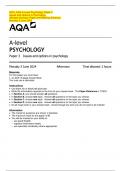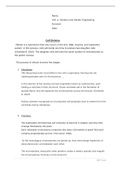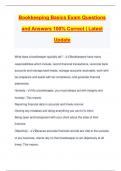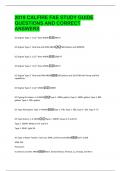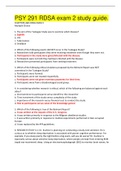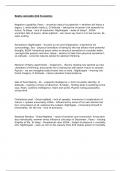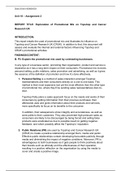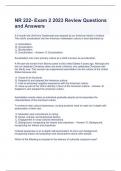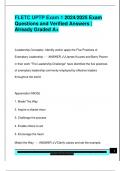Issues and Options in Psychology
(Merged Question Paper and Marking Scheme)
Monday 3 June 2024
A-level
PSYCHOLOGY
Paper 3 Issues and options in psychology
Monday 3 June 2024 Afternoon Time allowed: 2 hours
Materials
For this paper you must have:
an AQA 16-page Answer Book.
You may use a calculator.
Instructions
Use black ink or black ball-point pen.
Write the information required on the front of your answer book. The Paper Reference is 7182/3.
In Section A, you should answer all questions.
In Section B, choose one topic. Answer all questions on the topic you choose.
In Section C, choose one topic. Answer all questions on the topic you choose.
In Section D, choose one topic. Answer all questions on the topic you choose.
Do all rough work in your answer book. Cross through any work you do not want to be marked.
Information
The marks for questions are shown in brackets.
The maximum mark for this paper is 96.
You will be marked on your ability to:
– use good English
– organise information clearly
– use specialist vocabulary where appropriate.
,A-level Psychology: Paper 3 Issues and Options in Psychology: Exam Preview Sections
This paper explores contemporary issues and debates in psychology, as well as specialized topics or options
that students choose to focus on. It requires you to apply your knowledge of psychology to complex real-
world issues and to critically assess psychological concepts, theories, and research in specific areas.
Key Areas Covered:
1. Issues and Debates in Psychology:
o The Nature-Nurture Debate: The extent to which behavior is influenced by genetic factors
(nature) or environmental factors (nurture). You’ll need to understand key studies and the
arguments on both sides.
o Free Will vs. Determinism: The debate over whether human behavior is determined by
external or internal factors (e.g., biological or environmental influences) or whether people
have the ability to choose their actions freely.
o Holism vs. Reductionism: Whether psychological phenomena are best understood by
looking at the whole system (holistic) or by breaking them down into their components
(reductionistic). This debate is especially relevant in biological psychology versus cognitive
psychology.
o Ethical Issues in Psychology: Discuss ethical dilemmas faced by psychologists, including
issues like informed consent, deception, and the use of vulnerable participants. Consider
how ethical guidelines are applied to research.
o Cultural Bias: The ways in which psychological theories and studies may reflect the cultural
biases of the researchers and how this affects the generalizability of findings.
o Gender Bias: Consider how psychological theories may be biased toward a particular
gender and the impact this has on psychological research and understanding.
2. Options in Psychology: Students typically choose from a range of specialized topics in psychology.
The areas of focus for Paper 3 include:
o Option 1: Relationships:
Theories of Relationship Formation: How relationships develop, including
explanations like the social exchange theory and the equity theory.
Sexual Selection and Evolutionary Psychology: How evolution has shaped
behaviors related to attraction, mate choice, and relationships.
Factors Affecting Attraction: The role of physical attractiveness, similarity, and
familiarity in romantic attraction.
Breakdown of Relationships: Theories explaining why relationships end, such as
Duck’s phase model of relationship breakdown.
o Option 2: Stress:
The Physiological and Psychological Effects of Stress: How stress affects the
body (e.g., HPA axis, fight or flight) and psychological health (e.g., anxiety,
depression).
Coping Mechanisms: Types of coping strategies, including problem-focused and
emotion-focused coping, and the role of social support.
Stress Management Techniques: The effectiveness of different stress management
techniques like cognitive behavioral therapy (CBT), mindfulness, and relaxation
techniques.
3. Evaluation and Application:
o Critically Evaluate Psychological Research: Analyze the strengths and weaknesses of
key research studies and theories within your chosen options, considering methodological
issues (e.g., validity, reliability, ethical concerns) and real-world applications.
o Link Theory to Practice: Understand how theories in your chosen option can be applied in
real-life contexts, such as therapy for mental health disorders, managing stress in the
workplace, or improving relationship counseling.
IB/G/Jun24/G4004/E12
7182/3
, 2
Section A
Issues and debates in psychology
Answer all questions in this section.
Read the examples in Table 1 then answer Questions 01 and 02.
Table 1
Angie is a psychologist who believes that phobias are affected by unconscious forces.
Bibi is a psychologist who believes that phobias are best treated holistically.
Carlo is a psychologist who believes that phobias are influenced by both nature
and nurture.
Dalia is a psychologist who believes that phobias can be explained in terms of
conditioning theory.
Emma is a psychologist who believes that phobias can be reduced to the levels of
cells and chemicals.
0 1 Which psychologist believes in interactionism? Write the correct name in your
answer book.
[1 mark]
0 2 Which psychologist believes in environmental reductionism? Write the correct name in
your answer book.
[1 mark]
0 3 What is meant by ethnocentrism in psychology?
[2 marks]
0 4 Outline two limitations of ethnocentrism.
[4 marks]
IB/G/Jun24/7182/3
, 3
0 5 Maria is a successful gymnast. Her mother was also an athlete and encouraged Maria
throughout her childhood, taking her to practice sessions before school from the age
of 5 years.
Maria is being interviewed about her success as a gymnast. In the interview she says,
‘I don’t know if I am like my mum or not. Wherever it came from, I always had a strong
motivation to succeed. Maybe I didn’t really have much choice. I was destined to be
a gymnast.’
Discuss determinism in psychology. Refer to Maria in your answer.
[16 marks]
Turn over for Section B
Turn over ►
IB/G/Jun24/7182/3
, 4
Section B
Relationships or Gender or Cognition and development
Choose one topic from Section B. Answer all questions on the topic you choose.
Topic: Relationships
0 6 A psychologist studied the effects of using different social media platforms. There were
60 participants. The psychologist assigned the first 30 people on the alphabetical list of
participants to Group 1 and assigned the remaining 30 people to Group 2.
The psychologist asked participants in Group 1 to use a new social media platform over
the course of a month. This platform promotes greater self-disclosure.
The psychologist asked participants in Group 2, the control group, to use a different new
social media platform over the course of a month. This platform does not promote
self-disclosure.
One way of improving this study would be to use random allocation. Explain how random
allocation could have been carried out.
[3 marks]
0 7 At the end of the month, the psychologist calculated the median number of ‘social media
friends’ for participants in each group. The results are shown in the following table.
Table 2 Median number of ‘social media friends’ for Group 1 and Group 2
Group 1 Group 2
(platform promoting (platform not promoting
greater self-disclosure) self-disclosure)
Median number of
71 42
‘social media friends’
What conclusion could the psychologist make from the results in Table 2? Justify
your answer.
[2 marks]
0 8 After conducting the study, the psychologist wrote up a psychological report.
Which section of the psychological report should include information about how the
participants were allocated to the two groups?
[1 mark]
IB/G/Jun24/7182/3
, 5
0 9 Suggest two examples of self-disclosure that might have occurred in the social media
communications of the participants in the study.
[2 marks]
1 0 Discuss the matching hypothesis.
[8 marks]
1 1 Outline and evaluate the role of sexual selection in human reproductive behaviour.
[8 marks]
Turn over for the next topic
Turn over ►
IB/G/Jun24/7182/3
, 6
Topic: Gender
1 2 A psychologist studied the effects of sex-role stereotyping in the media. There were
60 participants. The psychologist assigned the first 30 people on the alphabetical list of
participants to Group 1 and assigned the remaining 30 people to Group 2.
The psychologist asked participants in Group 1 to watch a list of sex-role stereotyped
TV programmes over the course of a month.
The psychologist asked participants in Group 2, the control group, to watch a list of
TV programmes which did not show sex-role stereotyping over the course of a month.
One way of improving this study would be to use random allocation. Explain how random
allocation could have been carried out.
[3 marks]
1 3 To analyse the results, the psychologist calculated the median sex-role stereotyping
score in a questionnaire for participants in each group at the end of the month. A high
score in the questionnaire means a participant shows higher sex-role stereotyped
attitudes. The results are shown in the following table.
Table 3 Median sex-role stereotyping score in a questionnaire for
Group 1 and Group 2
Group 1 Group 2
(sex-role stereotyped (non sex-role stereotyped
TV programmes) TV programmes)
Median sex-role
stereotyping score in
71 42
the questionnaire
(out of 100)
What conclusion could the psychologist make from the results in Table 3? Justify
your answer.
[2 marks]
1 4 After conducting the study, the psychologist wrote up a psychological report.
Which section of the psychological report should include information about how the
participants were allocated to the two groups?
[1 mark]
1 5 Suggest two examples of sex-role stereotyped behaviour that might have occurred in the
TV programmes watched by Group 1.
[2 marks]
IB/G/Jun24/7182/3
, 7
1 6 Discuss the role of identification in the development of gender.
[8 marks]
1 7 Outline and evaluate psychological research into androgyny.
[8 marks]
Turn over for the next topic
Turn over ►
IB/G/Jun24/7182/3

